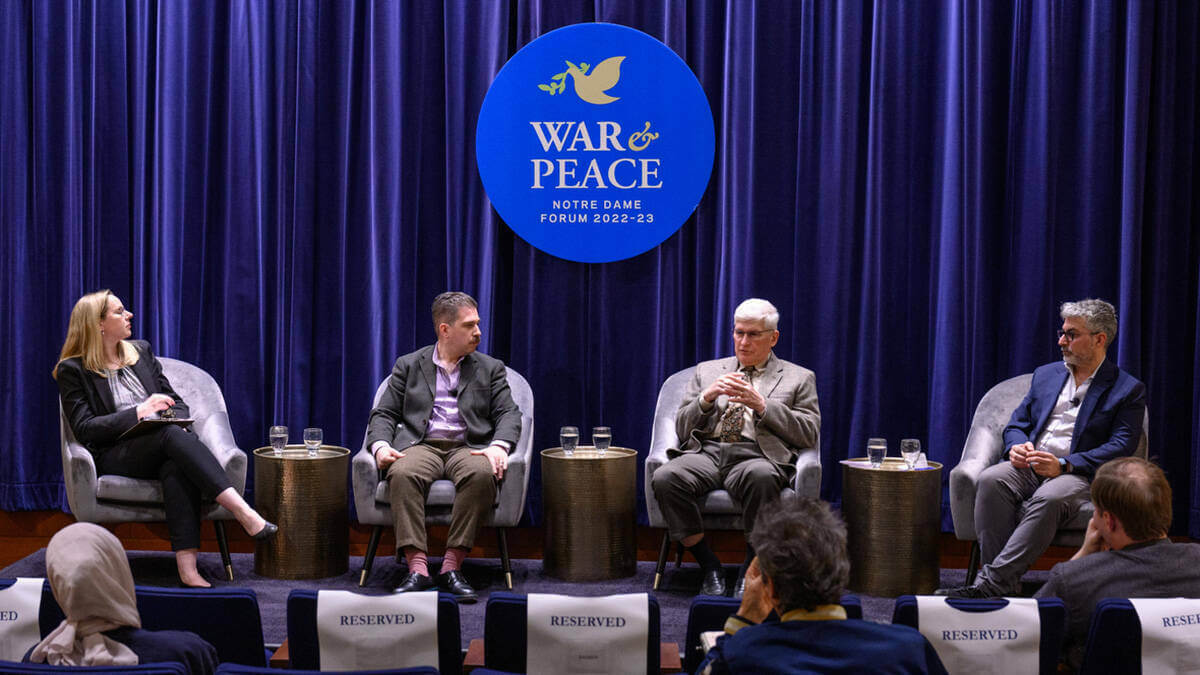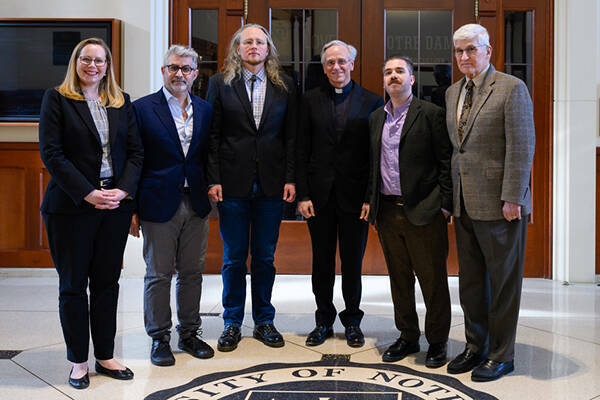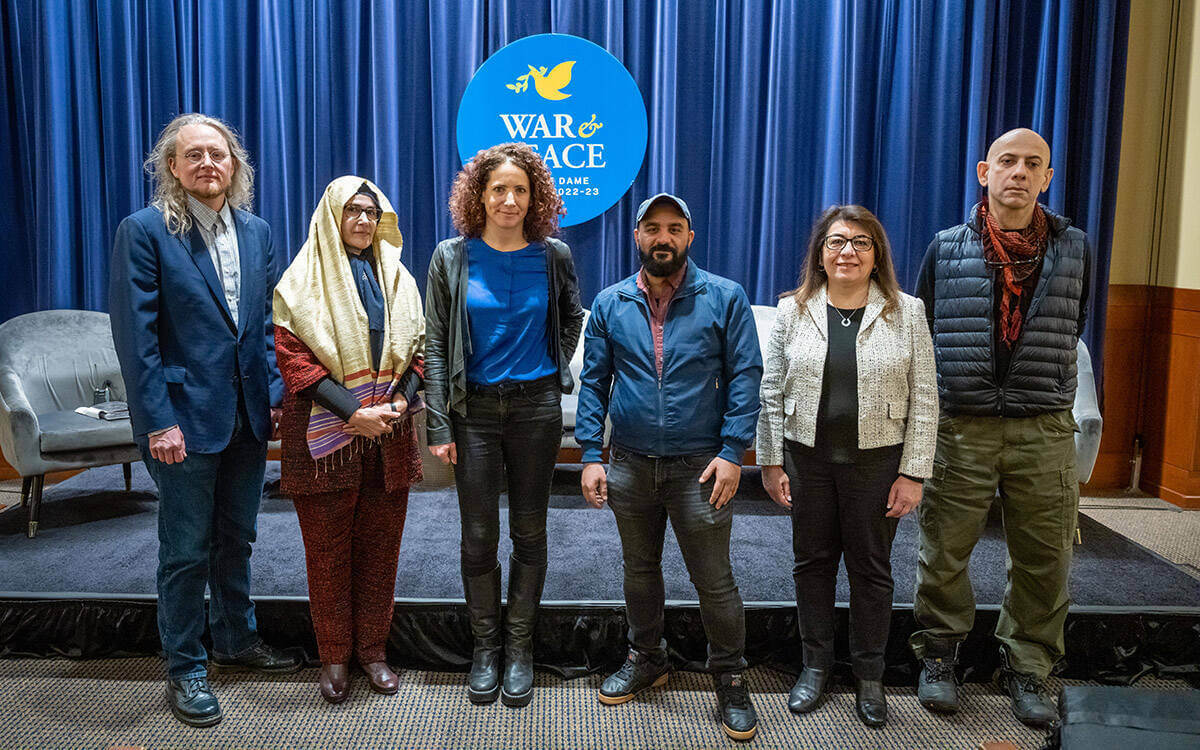
In introducing the first of two Notre Dame Forum events reflecting on the 20th anniversary of the U.S. invasion of Iraq last week, Roy Scranton stated that the eight-year conflict “was supposed to be a quick war.”
“It was supposed to be an easy war. It was supposed to be a good war. It was supposed to be a just war,” said Scranton, an associate professor of English at Notre Dame and an Army veteran who served in Iraq.
“It was none of these things.”
As the world marked the anniversary, an array of expert journalists, historians and writers from across the globe gathered for two discussions on Notre Dame’s campus Thursday (March 30) and Friday (March 31) to examine the complex repercussions of the conflict.
The panels, both held in the Eck Visitors Center Auditorium, served as the final keynote events of this year’s Notre Dame Forum on war and peace.

Thursday evening’s event, “Aftermaths I: The Invasion of Iraq in Historical Perspective,” featured opening remarks by University President Rev. John I. Jenkins, C.S.C., who noted that “the consequences of the invasion and occupation continue to reverberate today, in Iraq, in our nation and across the globe.”
The discussion was moderated by Rosemary Kelanic, an assistant professor of political science at Notre Dame, and featured panelists Spencer Ackerman, a national security correspondent; Andrew J. Bacevich Jr., a professor emeritus of international relations and history at Boston University and retired colonel in the United States Army; and Omar Dewachi, an associate professor of medical anthropology at Rutgers University. (Jane Arraf, New York Times Baghdad bureau chief and former CNN Baghdad bureau reporter who covered the war, was scheduled to participate but, due to personal circumstances, was unable to attend.)
Ackerman, who has reported from the front lines of Afghanistan, Iraq and Guantanamo Bay, shared a firsthand account of the toll the occupation took on the Iraqi people. He called for the U.S. to make amends, saying that “the Iraq War had real winners, and among them were the oil companies and the military industrial complex that benefited from the consistent increases in U.S. defense spending that have characterized the past 20 years.”
According to Bacevich, the war had a tremendous impact on American democracy and served as a catalyst for the nation’s current “culture wars.” He argued that it helped to transform “Trumpism” — which he defined not as an affiliation with the person of former President Donald Trump, but as a deep-seated sense of anger and alienation over the decline of traditional morality, the loss of blue-collar jobs and America’s place in the world — from a marginal phenomenon to something far more powerful.
Dewachi focused on the human and environmental impact of decades of conflict in Iraq, discussing the contaminants war brought to the country — and the subsequent health issues Iraqis face. Since the 1990s, Iraq has been “the subject of a biological experiment,” he said, and “the aftermath of the war, the destruction of a country and society and the wounding of bodies and environment will continue to haunt this country, and probably this planet, like a curse.”
During the Q&A portion of the event, the panelists further explored the origins of the war, its lingering effects and its ramifications for current and future conflicts — including the war in Ukraine.

In Friday’s event, Iraqi and Iranian authors shared firsthand experiences through poetry, short stories, book excerpts and conversation. “Aftermaths II: The Invasion of Iraq in the Present” was moderated by Atalia Omer, associate professor of religion, conflict and peace studies in the Keough School of Global Affairs. She was joined by four writers who read portions of their work.
Dunya Mikhail, an Iraqi American poet and writer, worked as a journalist and translator for the Baghdad Observer until, facing censorship and interrogation, she left Iraq in 1995. Reading from her poem “A Second Life,” Mikhail said, “After this life, we’ll need a second life to apply what we learned in the first. We make one mistake after another and need a second life to forget. Suffering takes time. We need a second life to learn to live without pain.”
Mortada Gzar read his short story titled “The Helmet House,” the narrative of a retired Iraqi teacher wrestling with his past as the school’s primary disciplinarian. An Iraqi novelist, filmmaker and visual artist, Gzar told the audience that war “destroys the memory of a country.” He urged Americans to learn the history of what happened and seek perspective on where it took place.
Salar Abdoh, an Iranian novelist and essayist, read from his novel “Out of Mesopotamia.” The work of fiction is a “story of men who come back from war and don’t know what to do with themselves,” Abdoh said, characterizing the novel as one based on collective experiences and an “obsession” with war. “During these years, I was struck by how men are in fact often attracted by war and even attracted to dying.”
Amal al-Jubouri completed the readings by sharing one of her poems in Arabic. An Iraqi writer, poet, translator, journalist and publisher, al-Jubouri thanked the University for “giving a voice to the voiceless Iraqis” as she shared that life “went from bad to worse” after the invasion of her country.
“Liberation and freedom cannot come from invasion,” al-Jubouri said during the Q&A portion of the program. She questioned why democracy had to be the goal for Iraq, when an appreciation for diverse thoughts and opinions should allow for differing values.
“If you believe in diversity, why do values have to be the same country by country?” she asked.
Hosted by University President Rev. John I. Jenkins, C.S.C., the Notre Dame Forum has been held annually since 2005, with events each year focused on a central theme of particular importance to the University, the nation and the larger world.
Originally published by at news.nd.edu on April 04, 2023.